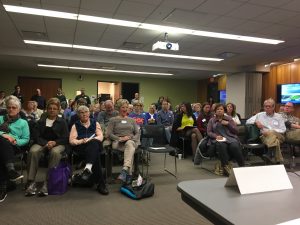On November 29, 2017, a standing-room-only audience packed the Community Room at the Needham Library to hear experts from government, business, and a local college describe the achievements and challenges involved in reducing local solid waste. The purpose of Green Needham’s “Moving Toward a Zero Waste Future” event was to highlight local success stories and to inspire others to get involved. The evening offered an array of surprising facts about recycling, as well as heartening news about initiatives to reduce food waste and fight food insecurity.

Jay Delaune, Green Needham’s team leader for Food Waste and Recycling, welcomed the audience of over 100 people. “This is what Green Needham is all about, ” added Green Needham chair Michael Greis. “We’re committed to bring people together from different parts of the community to find ways to benefit the environment and save money. Moving toward zero waste has multiple benefits because it means reducing the number of materials to be discarded in the first place and treating what’s left as resources, not something to be burned or buried.”
Greg Cooper, a Needham resident who serves as the Director of Business Compliance and Recycling for the Mass. Department of Environmental Protection, pointed out that Massachusetts pays over half a billion dollars a year to throw things away. The State’s current 10-year solid waste plan, covering 2010 to 2020, has the ambitious goal of reducing the yearly volume of solid waste disposal by 2 million tons, from 6.5 million tons to 4.5 million tons. “By 2015, ” explained Cooper, “we had reached about half that goal. Now comes the harder part.”
The challenges are many. Statewide, 10-15% of residents do not have access to recycling services, and waste characterization studies indicate that 30% of the items in the trash are materials that don’t belong there, such as paper, cardboard, glass, metal and plastic containers, and brush.
What about Needham? Greg Smith, Superintendent of the RTS (Needham Recycling & Transfer Station) stressed that Needhamites generally do a good job at recycling, but there is much room for improvement. Proper sorting is key — putting the right object into the right place. Sounds simple, but in Needham, yellow trash bags meant only for garbage sometimes contain many items that could be recycled. Take a look in the collection bins and you might see plastic containers thrown in with mixed paper. And in the commingle collection bin, it’s not hard to find jars smeared with food residue and trash thrown in with the recyclables. With a limited market for recyclables, handlers want a “clean,” uncontaminated stream of recyclables. Recyclables contaminated with food residue and trash lose money for the Town.
The audience learned that:
- Of the 300,000 tons of textiles discarded each year in Massachusetts, 90% could have been recovered. At the RTS even torn or stained clothing can be given to Goodwill, for example, as long as the items aren’t moldy or contaminated.
- Plastic bags should never be put in with other recyclables at the RTS, since they jam up the machinery at the sorting facilities and need to be laboriously cut out. If someone tosses recyclables packed in a plastic bag into the commingle bin, the entire bag will be thrown out at the recycling sorting facility. Plastic bags should be taken to the grocery store to be recycled.
- Flinging corrugated cardboard boxes into the mixed paper containers at the RTS loses money for the Town. Why? Corrugated cardboard is more valuable than mixed paper. Corrugated cardboard should always be flattened and placed in the special cardboard-only container.
Greg Smith went on to describe how the RTS is making a contribution to keep food waste out of the trash. The RTS makes valuable compost by mixing brush dropped off by residents and 35 tons per week of food waste from Boston area businesses. Also contributing food waste to the operation is a student-led composting program at Hillside Elementary School, which has inspired Needham High School students to look into separating cafeteria food waste for composting as well.
Lor Holmes, of CERO (Cooperative Energy, Recycling, and Organics), spoke about the Dorchester-based company that brings the 35 tons of food waste to the RTS each week to be composted. The company transports the finished compost to local farms. A worker-owned cooperative, CERO’s mission is a social venture to keep food waste out of landfills while providing good green jobs. They offer training to their customers’ employees to make sure the food waste delivered to the RTS has few contaminants. Green Needham has helped CERO get contacts in the Needham community, and the company now picks up food waste from Roche Bros., Sudbury Farms, and Olin College.
Jim Drumheller, General Manager of Dining Services, Rebecca’s Café at Olin College, doesn’t like to see anything wasted. Food waste from plate scrapings and food preparation are picked up by CERO for composting at the RTS. As a wonderful addition to these efforts, unused food that has been kept at a safe temperature is frozen every day. An organization called Food for Free makes weekly pick-ups, repackaging the food and distributing it to people in need. Through efforts of Wellesley activists, Babson College, Wellesley College, and the Wellesley Public Schools also participate in the program. Other measures to reduce waste at Olin include reusable take-out containers. Students pay an initial charge and, upon returning the container, are given another container or a token which entitles them to a take-out container at a later time. Jim is currently looking at the possibility of reusable take-out coffee mugs.
The Q&A that followed the presentation expanded the conversation to include representatives from other Needham organizations and nearby communities. Among those were:
- Beth Israel Deaconess Hospital
- Roche Bros. and Sudbury Farms
- Trader Joe’s
- Municipal and community representatives from Babson College, Dedham, Dover, Natick, Newton, and Wellesley
It’s no surprise that the Community Room was still buzzing with conversations and excitement well after the program ended. Green Needham welcomes participation from anyone interested in getting involved in the follow-up activities, and in Recycling or Food Waste issues generally. Please contact Green Needham’s team leader, Jay Delaune.


Pingback:Moving Toward a Zero Waste Future - League of Women Voters of Needham